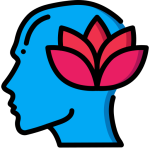
Mindfulness Techniques for Exam Stress:
Staying Calm in the Face of Pressure
As you navigate the path towards your GCSE Computer Science exam, pressure can build. Anxiety, stress, and overthinking might sometimes overshadow your hard work. Here's where mindfulness enters the scene—a tool to ground you, bringing calm amidst the academic storm. Here are practical techniques tailored for you.

1. Grounding Breath Work
Why It Matters: Deep, conscious breathing can regulate the nervous system, moving you from a stressed state to a calm one.
Action Step: Take a 5-minute break from revision. Sit comfortably, inhale deeply for 4 counts, hold for 4, exhale for 4. Repeat 10 times. Feel the difference?

2. The Five Senses Exercise
Why It Matters: Engaging all your senses draws you back to the present moment, taking attention away from anxiety-inducing thoughts.
Action Step: Pause and observe five things you can see, four you can touch, three you can hear, two you can smell, and one you can taste. This simple exercise can create a mini mental escape during intense study sessions.

3. Guided Imagery
Why It Matters: Visualising a peaceful setting can reduce stress hormones in the body.
Action Step: Close your eyes and imagine your favourite peaceful spot. It could be a beach, forest, or even a quiet room. Immerse yourself in the details—the sounds, sensations, and smells.

4. Body Scan Meditation
Why It Matters: Recognising tension in your body and consciously relaxing can release physical stress, often leading to mental relief.
Action Step: Starting from your toes, mentally scan up through your body, noticing any tension. As you notice it, take a deep breath and imagine it melting away. This can be done during short breaks or before bed.

5. Mindful Note-Taking
Why It Matters: Engaging fully in the process of taking notes can enhance retention and reduce the feeling of overwhelm.
Action Step: As you use the online note-taking facility on ReviseCS, fully engage in the process. Observe the movement of your fingers on the keys, the words forming on the screen, and the rhythm of your thoughts.

6. Gratitude Journaling
Why It Matters: Shifting focus from anxiety to gratitude can change your brain's chemistry, producing a calming effect.
Action Step: At the end of each study day, jot down three things related to your revision that you're thankful for. It could be a concept understood, a productive session with aiAnna, or simply the dedication you showcased.

7. Mindful Breaks with Gamified Learning
Why It Matters: Integrating mindfulness with engaging activities can provide a double benefit—relaxation and revision.
Action Step: Use the gamified elements on ReviseCS mindfully. Observe the graphics, engage in the activities, and enjoy the process. These breaks can refresh your mind, making the next study session more productive.
In conclusion, the journey towards GCSEs can indeed be stressful, but with these mindfulness tools in your arsenal, you're better equipped to handle the pressure. Embrace them, practice regularly, and witness a calmer, more centred version of yourself, ready to face any academic challenge head-on.
